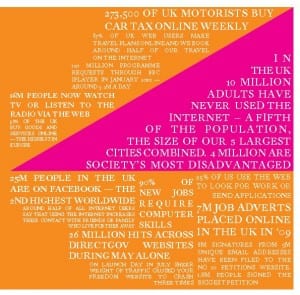‘Digital Britain’ has survived the election and the drive to get us all online by 2012 has stepped up a gear. The strap line to the Race Online 2012 website now reads ‘We’re all better off when everyone’s online’ and David Cameron’s letter Martha Lane Fox to remains Digital champion includes the following: “…the Government is committed to increasing transparency and accountability through making information systematically available online…we need to encourage more people to go online and hence be able to access public information and services.”
So far so good – so long as we have digital equity. The Labour government made an explicit link between social and digital exclusion and while it didn’t go far enough, it was a promising start. Race Online 2012 has a new manifesto. and it increasingly clear there is a new agenda. Online, the manifesto is a visual horror. The 67 page 5.56 MB PDF offers no respite. This is a prime example of style over substance. The Manifesto for achieving for 100% digital inclusion demonstrates how to be digitally exclusive right from the start.
Putting the dreadful design to one side, what is Race Online about? The message is clear. The government is replacing people run services with online services. If you can’t access them then tough. The reasons for not going online are lack of motivation, access and skills. The government is going to sort out the access, then its up to you to get motivated and virtually re-educated. Its for your own good. The benefits of being online are obviously about economics, education, employability and improved efficiency of public welfare so how can you not see the benefits?
The Manifesto is glossy, in your face and totally inadequate. It recognises 48% of disabled people are not online but on its own that figure means nothing. Words like assistive technology, accessible design and inclusive practice are absent (in both text and the sub-text of the design). There’s no recognition of the issues of the cost of assistive software or even how with all the prerequisites in place, if digital data is not designed with the needs of assistive technology in mind then access will continue to be denied. Focus is on the transformative power of the Internet to create a new networked nation with no indication of how vulnerable citizens, already disempowered by inadequate access to welfare and barriers to social participation, are going to be supported.
The move towards virtual citizenship is alarming. Divisions between those with digital competence and those without are already creating new structures of power and dependency. The computer both connects us and isolates us. It supports a digital economy where nothing is real but we all pretend that it is. In the future, anarchy won’t be virtual it will be human. Science fiction won’t be about machines, but about people. The Internet can offer unparalleled access to information and opportunities to participate in the active construction of knowledge, but it can’t substitute for care and welfare. The greatest problem is that those driving the agenda don’t care about the impossibility of digital equity while those best placed to highlight the issues are being denied a virtual voice.
